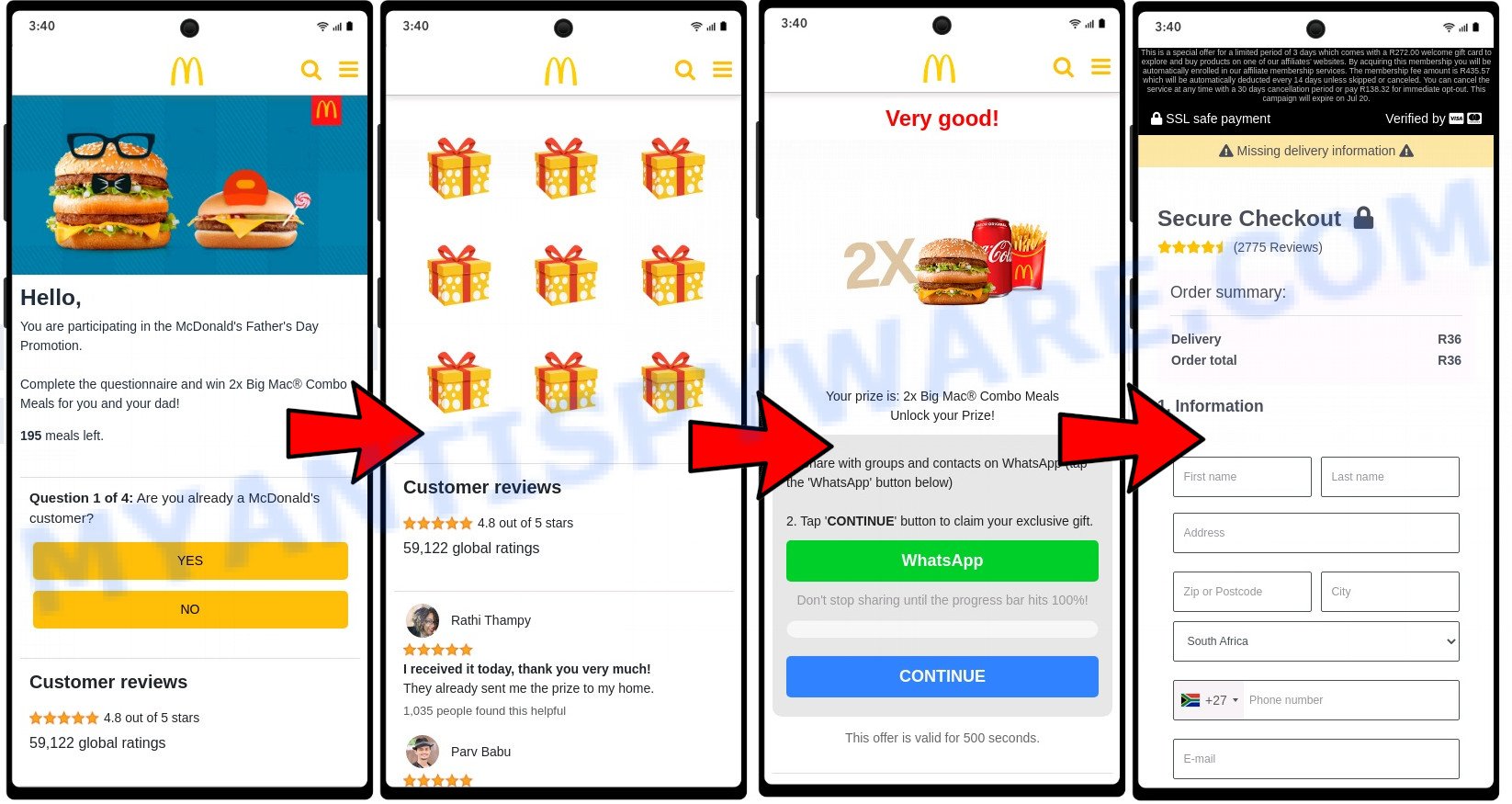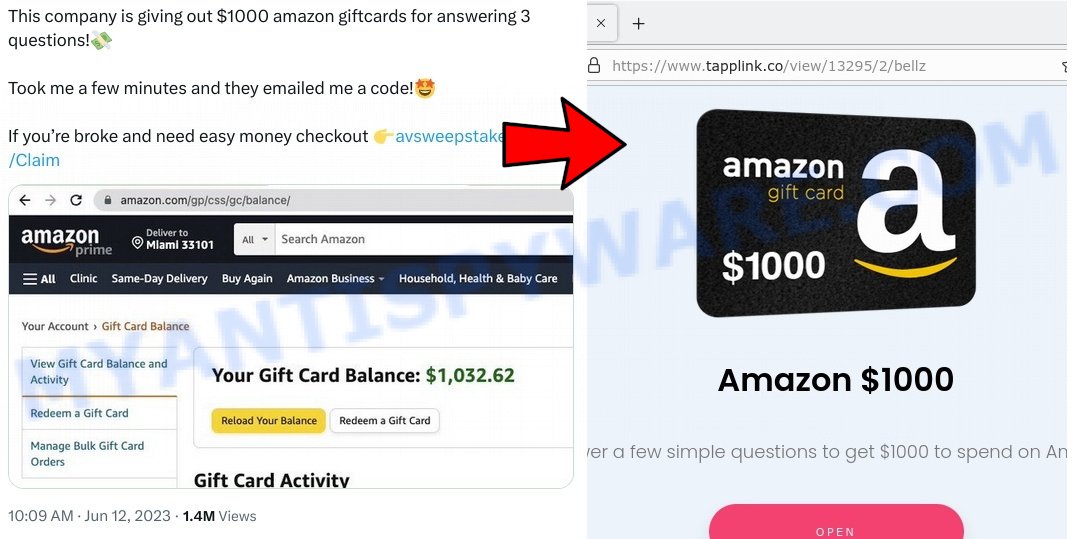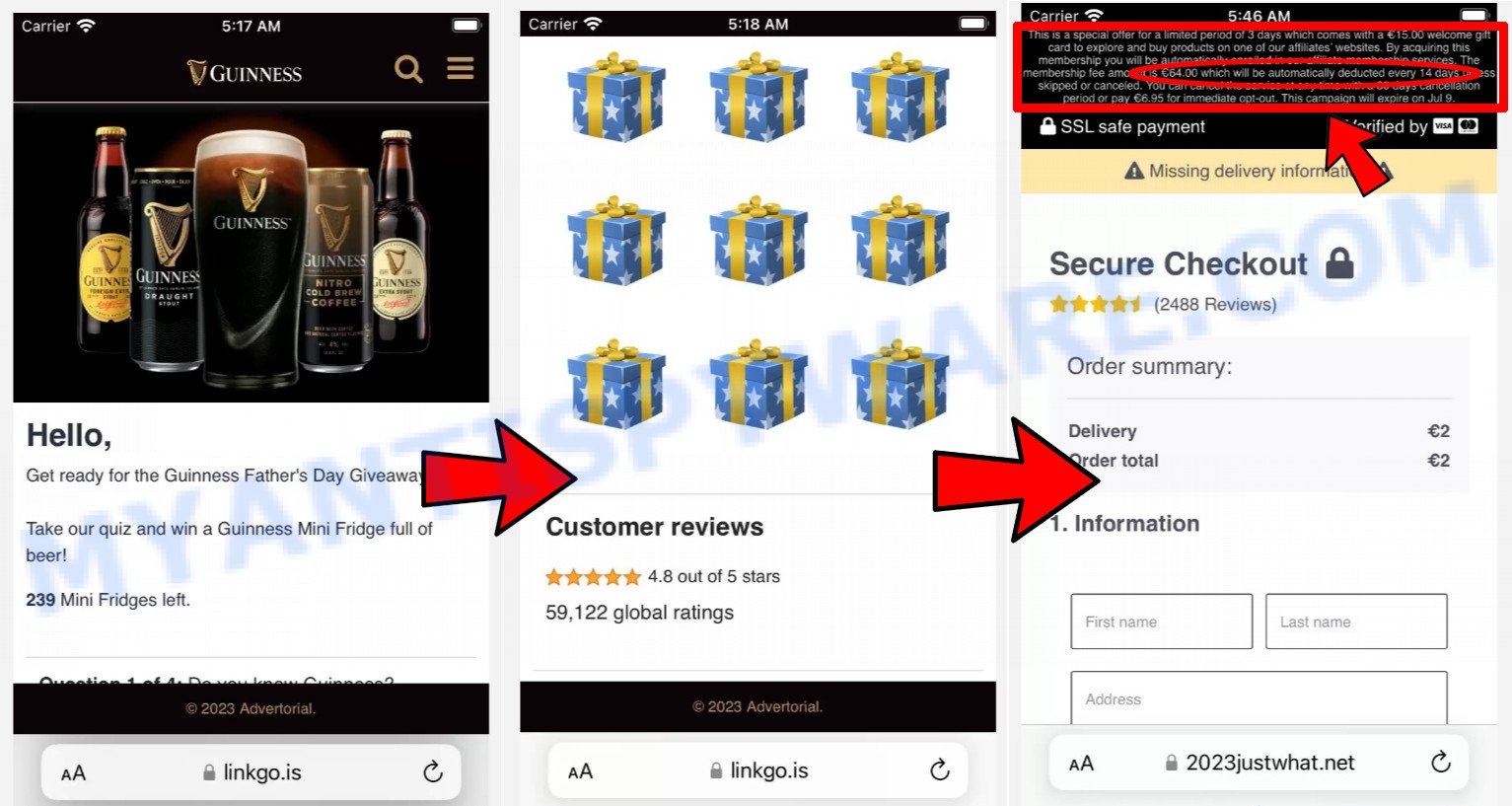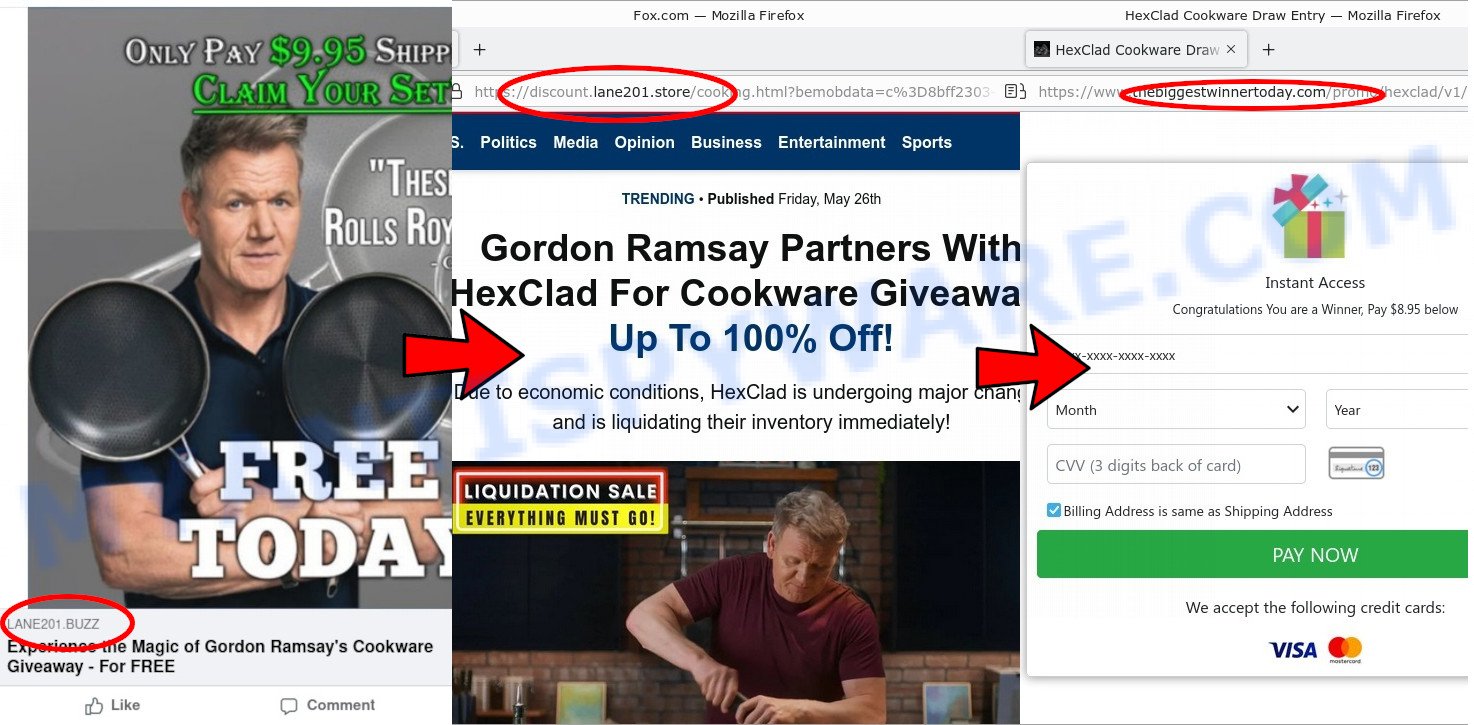Beware of a new online scam masquerading as a Shein Summer Giveaway. Scammers are targeting unsuspecting individuals through WhatsApp messages, enticing them with the promise of winning a €500 gift card. The scam begins with a seemingly innocent quiz, but quickly escalates into a fraudulent scheme. Victims are tricked into sharing the scam with their contacts and providing personal information, ultimately being unknowingly enrolled in a costly subscription service.
Protect yourself and your loved ones by staying informed about this scam. Read the full article to understand the tactics employed by these scammers and learn how to avoid falling victim to such fraudulent schemes.
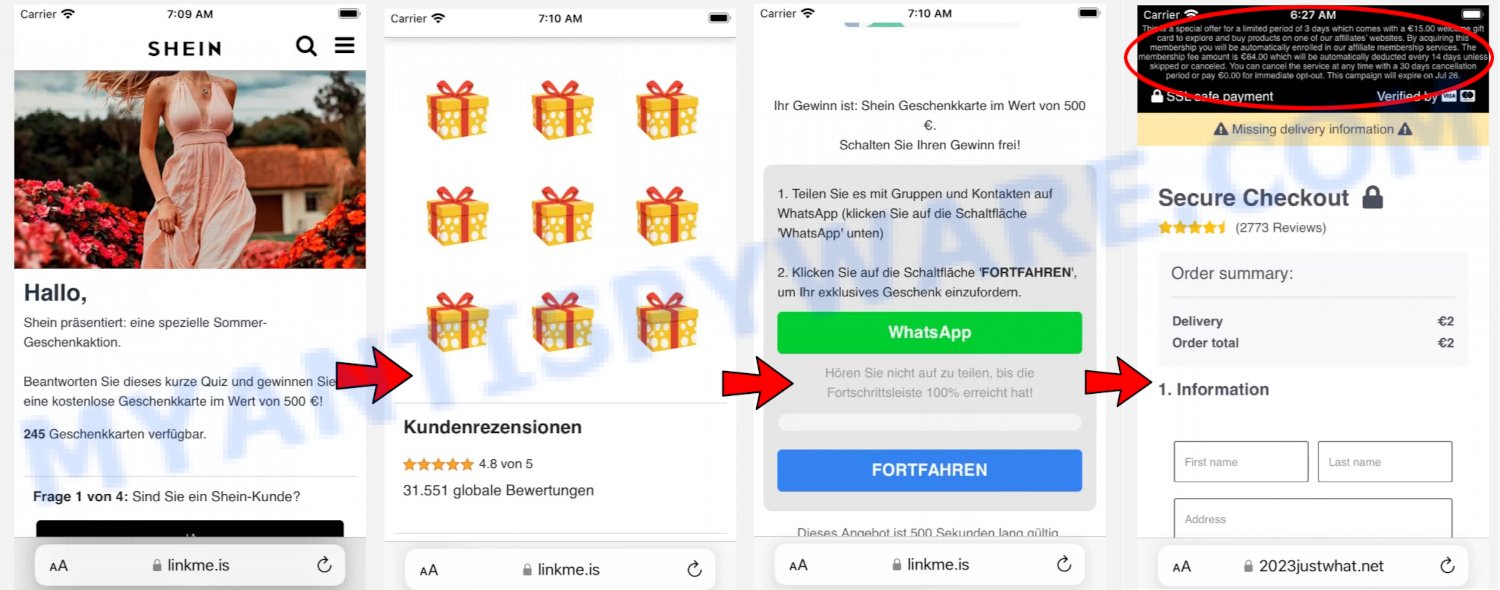
QUICK LINKS
- How the Shein Summer Giveaway Scam works?
- What to do if you receive a message with a link to the Shein Summer Giveaway?
- How to Spot and Avoid Such Scams?
How the Shein Summer Giveaway Scam works?
The Shein Summer Giveaway scam is part of a series of fraudulent schemes that have surfaced recently, indicating a recurring pattern in online scams. In a similar fashion to previous scams, individuals receive a message inviting them to participate in the Shein Summer Giveaway. What makes this scam particularly deceptive is that the message can come from both friends and complete strangers, adding a layer of trust to the scheme.
The message contains a link that appears to be from a URL shortener service, such as myshort.ru, linkme.is or linkgo.is. Upon clicking the link, victims are directed to a page on the scam website, where they are presented with the enticing opportunity to win a €500 gift card from Shein, a well-known online retailer.
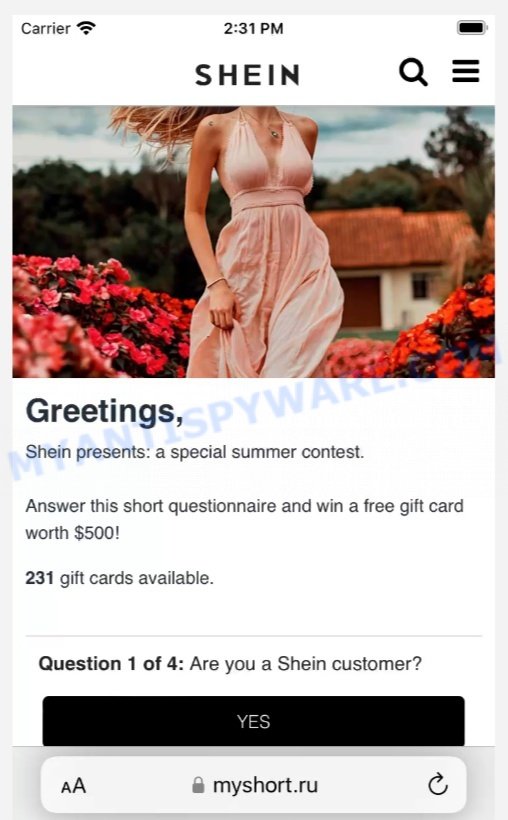
The first page on the scam website greets users with a text mentioning Shein and introduces the purported Special Summer Contest. To proceed, users are asked to answer four simple questions, which may include inquiries about their Shein customer status. After responding, victims are redirected to a new page that congratulates them on successfully saving their answers.
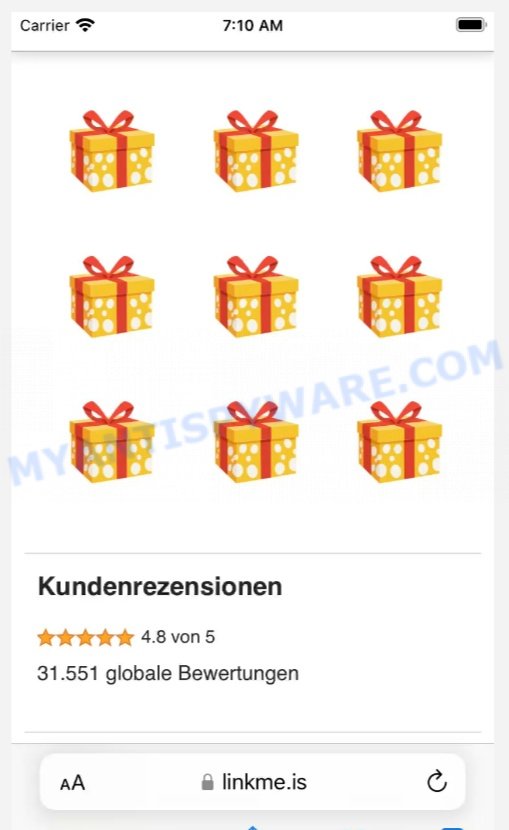
On this second page, users are instructed to select the correct box containing the gift. Interestingly, regardless of which box is initially chosen, the second attempt always results in the display of a winning message, claiming that the user has secured a Shein gift card valued at €500. This tactic is employed to create a sense of excitement and urgency, luring victims further into the scam.
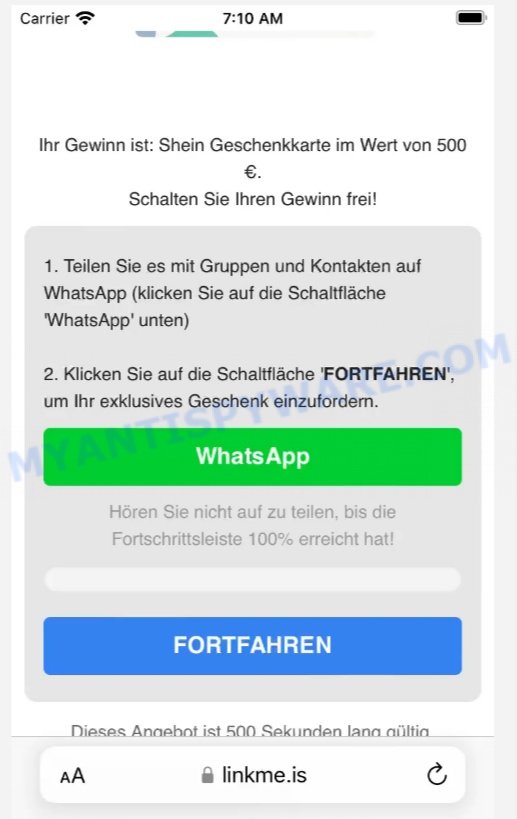
To claim the prize, victims are prompted to share the scam with their contacts on WhatsApp, thereby amplifying its reach. They are then directed to input their delivery address and complete the registration process. However, at this point, the true intentions of the scammers become evident.
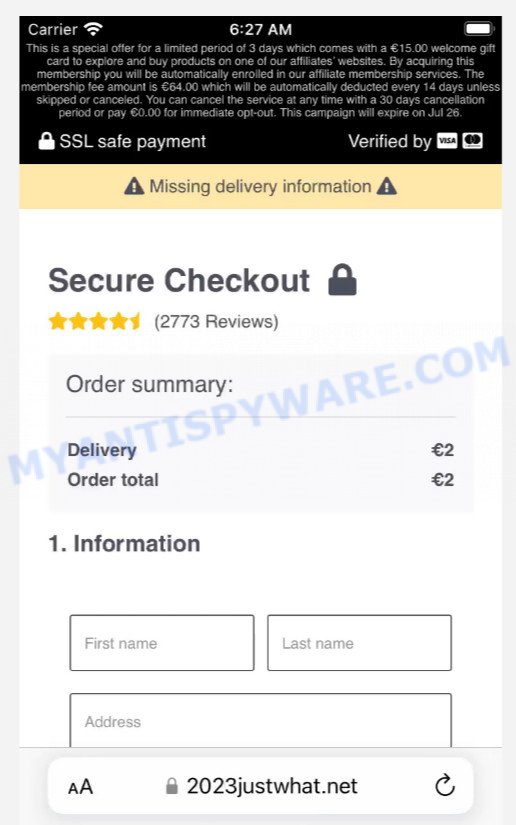
Upon proceeding, victims are presented with a page stating that they have won the Shein gift card worth €500, but to unlock their prize, they need to complete a form by clicking on the “FINISH” button. The fraudulent website cleverly presents this form in a way that obscures the real intentions of the scammers. The text detailing the actual offer—a membership subscription with a fee of €64.00 deducted every 14 days unless canceled—is displayed in small, hard-to-read letters on a black background. Meanwhile, the “Order summary” prominently displays a seemingly insignificant delivery fee of €2.00, intentionally misleading victims into believing they are paying for the delivery of their winnings.
At this stage, victims are required to provide their personal information, including their first and last name, address, zip/postcode, city, phone number, and email address. Additionally, they are prompted to enter their credit card details, completing the illusion of claiming their prize. Unbeknownst to the victims, by submitting this form, they are inadvertently subscribing to an expensive membership service without their explicit consent.
Shein Summer Giveaway scam exploits the trust of individuals by leveraging social connections and deceptive tactics. The scammers employ various strategies, such as sending messages through WhatsApp, using fake URL shorteners, and creating enticing quizzes and gift-selection pages. Their ultimate goal is to trick victims into subscribing to costly membership services under the guise of claiming their prize. By playing on people’s desires for rewards and exploiting their willingness to share with others, scammers manipulate victims into divulging personal information and unknowingly entering into financial commitments.
Examples of such scams
Scammers are becoming increasingly adept at exploiting people’s trust and desires through deceptive online schemes. The Shein Summer Giveaway scam is just one instance of these fraudulent tactics. To shed light on the broader landscape of similar scams, we present a compilation of other notable examples below. These scams employ various techniques, target different platforms, and prey on people’s eagerness for rewards. By understanding the common elements and patterns, we can better equip ourselves against falling victim to these schemes.
Explore the following examples to gain insights into the diverse ways scammers attempt to deceive individuals online: McDonald’s Father’s Day Promotion Scam, Mr Beast Giveaway SCAM, and Gordon Ramsay HexClad Cookware Giveaway Scam. By familiarizing ourselves with these examples, we can better protect ourselves and others from falling victim to such deceitful practices.
- McDonalds Fathers Day Promotion Scam
- Avsweepstakes.com Scam
- Guinness Fathers Day Giveaway Scam
- Pit Boss Grill Facebook Scam
- Gordon Ramsay HexClad Cookware Giveaway Scam
What to do if you receive a WhatsApp message or social media post with a link to the Shein Summer Giveaway
If you receive a WhatsApp message or social media post with a link to the Shein Summer Giveaway, there are several steps you can take to protect yourself:
- The first and most important step is to avoid clicking on the link. This can help prevent you from being directed to a fake website or downloading harmful software.
- If you are interested in participating in the promotion, it is recommended to verify the legitimacy of the promotion by checking the official Shein website or social media channels. Legitimate promotions are usually advertised on the company’s official channels, so if you cannot find any information about the promotion there, it is likely a scam.
- If you suspect that the message is a scam, report it to the relevant authorities. For WhatsApp, you can report the message by tapping and holding on the message and selecting “Report” from the menu. For other social media platforms, look for a “Report” or “Flag” option.
- If you receive a suspicious message, it is important to warn your contacts about the scam to prevent them from falling victim to it. You can do this by forwarding the message to your contacts and explaining why you believe it is a scam.
- Never provide personal information, such as your address, phone number, or credit card details, in response to a suspicious message or website. Legitimate companies would never ask for this information in this way.
By following these steps, you can help protect yourself and others from falling victim to the Shein Summer Gift Promotion scam and other similar scams.
Threat Summary
| Name | Shein Summer Giveaway Scam, Shein Special Summer Contest Scam, €500 Shein gift card WhatsApp Scam |
| Type | Phishing Scam |
| Fake claims | Participants can win a €500 Shein gift card through a quiz and gift-selection process. |
| Scammers websites | myshort.ru, linkme.is (fake URL shortener) |
| Disguise | Pretending to be a Shein Summer Giveaway, Fake URL Shortener |
| Symptoms | Deceptive WhatsApp messages, fake quiz, misleading gift selection |
| Damage | Financial loss, unauthorized subscriptions, personal information compromise |
| Distribution | WhatsApp messages, social media sharing |
| Target Audience | General internet users |
| Prevention Tips | 1) Do not click on suspicious links; 2) Verify the legitimacy of the promotion through official channels; 3) Warn your contacts about the scam; 4) Protect your personal information |
| Reporting Info | Report suspicious messages to WhatsApp by tapping and holding the message and selecting “Report” |
How to spot and avoid such scams?

Here are some tips on how to spot and avoid scams like the Shein Summer Giveaway Scam:
- Be wary of unsolicited messages. If you receive a message or email from an unknown sender, be cautious. Do not click on any links or download any attachments until you have verified that the sender is legitimate.
- Look out for spelling and grammatical errors. Scammers often use poor spelling and grammar, which can be a red flag. Legitimate companies usually have a team of professional writers who proofread their communications.
- Check the website address. Before you enter any personal information or payment details, make sure you are on a legitimate website. Check the URL to see if it matches the company’s official website.
- Verify Suspicious Links with Online Scanners. Use online services such as VirusTotal or URLScan.io to scan the suspicious link before clicking on it. To do this, copy the URL of the suspicious link and paste it into the search bar of the VirusTotal or URLScan.io website.
- Don’t give out personal information. Be cautious about giving out personal information, such as your name, address, phone number, or email address. Legitimate companies will not ask for this information unless it is necessary to complete a transaction.
- Be suspicious of offers that seem too good to be true. Scammers often use enticing offers to lure people in. If an offer seems too good to be true, it probably is.
By following these tips, you can reduce your risk of falling victim to scams like the Shein Summer Giveaway Scam. If you suspect that you have been targeted by a scam, report it to the relevant authorities immediately.
Conclusion
The Shein Summer Giveaway scam is yet another addition to a series of deceptive schemes that exploit unsuspecting individuals by leveraging fake URL shorteners. This scam follows a similar modus operandi as the previously reported McDonald’s Father’s Day Promotion Scam and Guinness Father’s Day Giveaway scams, which utilized a different fake URL shortener called linkgo.is.
These scams employ cunning tactics, enticing victims with promises of free prizes and gift cards, only to trick them into providing their credit card information under the pretense of covering shipping fees. Unbeknownst to the victims, they are unwittingly signing up for costly subscriptions that can drain their finances, amounting to hundreds of dollars in losses.
To safeguard ourselves and others, it is crucial to remain vigilant, scrutinize offers that seem too good to be true, and verify the authenticity of promotions through official channels. By raising awareness about these scams and adopting a cautious approach, we can collectively combat these fraudulent practices and protect ourselves from financial harm. Stay informed, stay skeptical, and together let’s thwart the efforts of scammers seeking to exploit our trust and hard-earned money.
